The Crooked Medium’s Guide To Murder – Book Tour and Giveaway
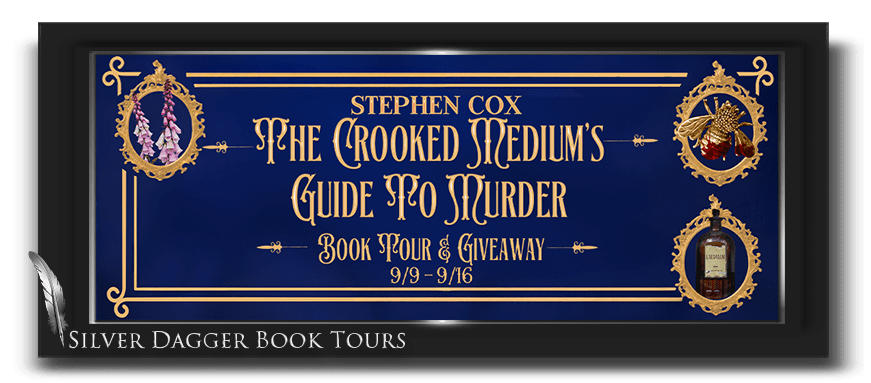
To solve a baffling murder – search both sides of the grave…
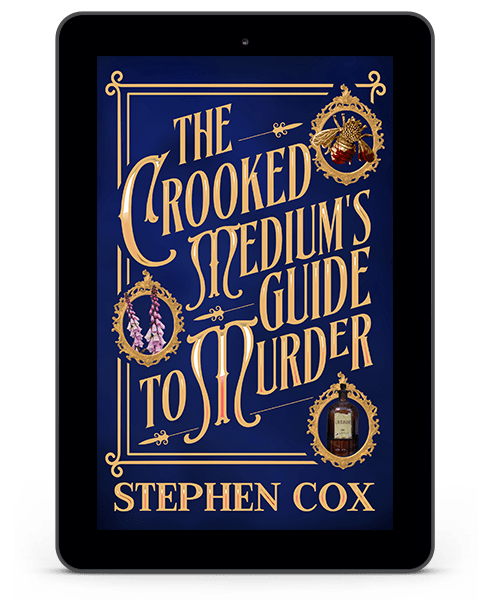
The Crooked Medium’s Guide To Murder
by Stephen Cox
Genre: Spooky Paranormal Victorian Murder Mystery

London 1881. Can two crooked women stop a murder?
Extravagant medium Mrs Ashton and her lover, blunt working-class Mrs Bradshaw, run a spiritualist scam. Mrs Ashton secretly reads minds.
Believing that Mrs Ashton is genuine, grieving Lady Violet craves the truth behind her mother’s untimely death. But Lady Violet’s powerful husband Sir Charles hates spiritualists. Has he killed before?
Uncovering this MP’s wicked crimes will put all three women in terrible danger…
To solve a shocking murder, look on both sides of the grave.
“An astonishing feat of twisting plots and perceptions”
“It’s deliciously twisty, with women who won’t be told, a young bride in peril, and the delicate art of a con.”
“A book I’ve been looking for all my life. Queer found family all wrapped up in a supernatural murder mystery. Absolute perfection.”
“a brilliant, gripping story. .. if you’re looking for a great new book to read, I encourage you to check it out.”
“…an actually intriguing mystery.”
“with a new murder thrown in and a couple of pre-existing ones uncovered, we get an astonishing story of redemption with well-plotted but never signposted twists and turns thrown in at every stage.”
“…a murder mystery with a supernatural spin. … the premise and plot were great. The story is very atmospheric with a very nasty aristocrat villain. ..an entertaining read…”
**Only .99cents!**
Amazon * Author’s Site * Bookbub * Goodreads
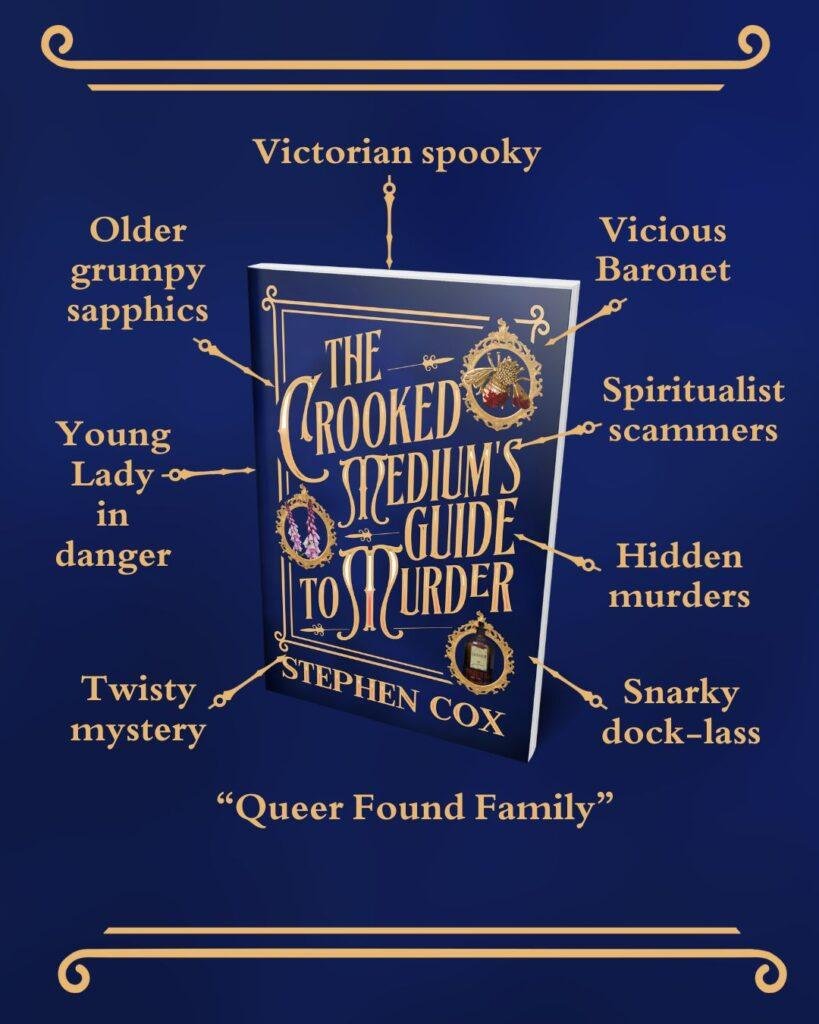
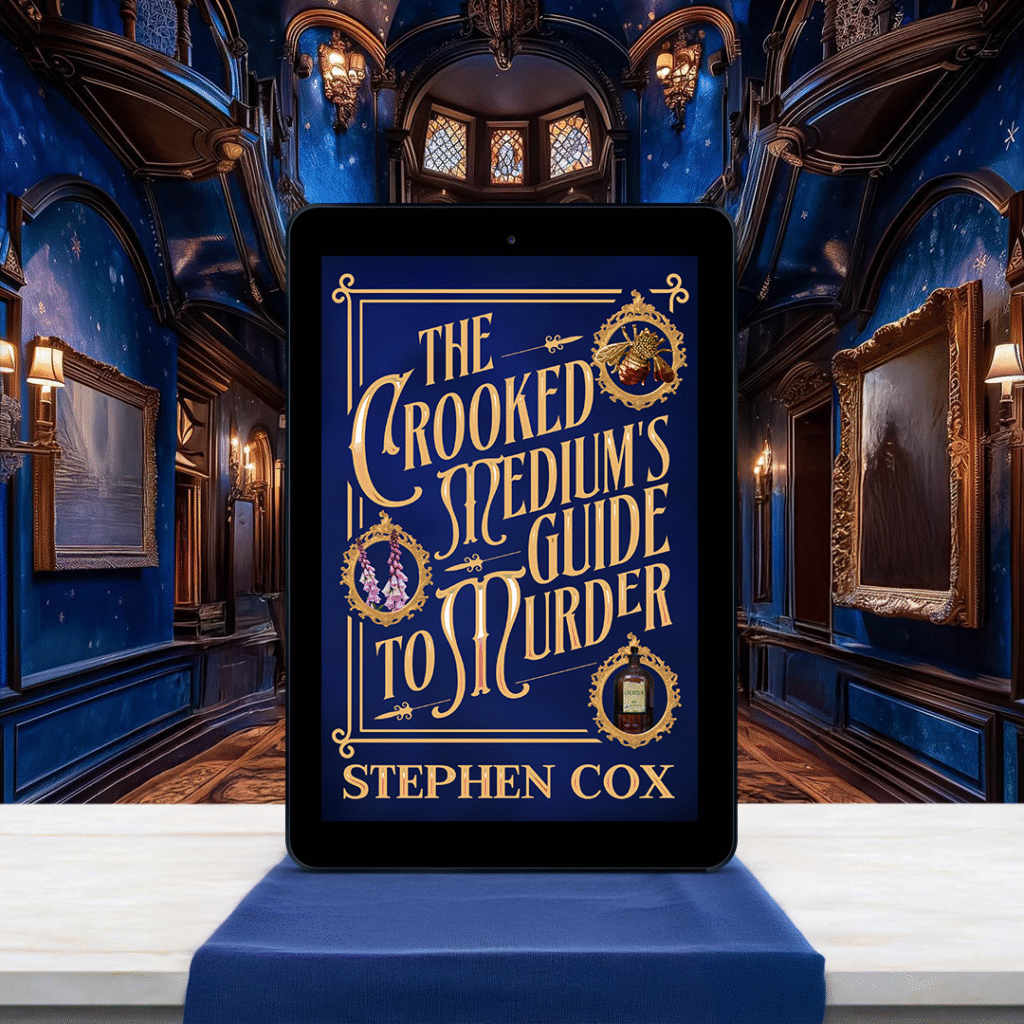

Chapter 1. The Mysterious Coachman
The church hall of St Martin the Ragged, Scamperdour Street, Thameswake, London
A Sunday afternoon in March, 188-
We would be failing in our duty to our readers if we did not report that the notorious spirit-monger Mrs Ashton has returned to London. Whether in a slum church in the docks, or in the parlours of the prosperous, this sham is up to her old games. We do not deny that some who profess Spiritualism are wholly sincere, nor could we ever criticise those who seek solace for their deepest grief. What we can say is that Honoria Ashton carries with her a malodorous history – of midnight flits and unpaid bills, of greasepaint and mummery, of disappointment and dishonesty. Does this music-hall trickster truly raise the dead? We say only that if you invite her to dinner, count your spoons.
The Orb
A church hall of dark wood and brass, gaslight struggling to cheer it. Mrs Ashton jabbed the smoking coals of the stove with the poker, coughing, trying to goad it to warmth. Soon her poor flock would come to hear the voices of the dead and as their shepherd, she ought to prepare.
Damn that editor – that jackal, Philistine, scourge. Damn the trouble he would make for her. Damn his innuendo and lies. When had she last stolen a spoon?
Oh, the mayor of Calais’s silver ladle. That didn’t count, that was retribution not theft.
Twenty-five minutes to the hour, a drab London sky through high windows.
‘Tha bacon’s shoddy stuff,’ Mrs Bradshaw said. A foot taller than her hinny, and scowling, Braddie set the table with plates of sandwiches under rough cloth, simple fare for the people of the docks. ‘If you don’t pay a man, don’t expect his best.’
Rain drummed on the roof and Braddie’s foul mood filled the room like a storm off a northern hill.
They had quarrelled at breakfast, when Braddie had hunted and found the hidden bills: a delightful new Japanese table, and a tasteful landscape Mrs Ashton had picked up for a song. Braddie spun a nightmare prophesy of bailiffs and moneylenders and Queer Street. The Scottish creditors finding her. Mrs Ashton believed that if you ignored the accounts, they lost their power over you. Something usually turned up.
She was six months returned to London and still her weekday respectable meeting – her income – struggled to grow. These Sunday meetings were for common folk. Men and women, dockers and sailors and workers in factories and laundries, some without honest work at all – she gave them hope. So many struggled even to cling to their own rung of the Great Ladder of Society.
Braddie winced; her back must be bad. Two vast teapots waited for the kettle.
Oh, dear one. Dear Braddie, stern disapproval the natural set of her well-worn face. Once, Braddie had taken her walking in her birthlands – the North Country– and Mrs Ashton had seen on that bleak moor a lone crag of grey rock, standing fiercely alone. Just like Braddie, true, solid, and uncompromising. She even dressed like a moor side, in dour greens and browns and greys.
Braddie was her right hand, the floor beneath her feet, the glowing stove in her home, the only one to whom all her secrets were open. Eight years her ‘dear heart’.
Mrs Ashton walked over, looked to check they were alone, and craned up to kiss her – as a lonely lass greets her returning sailor, or the sailor the lass.
A flicker of a shy, warm smile and ‘Well, Honeybee,’ Braddie said. ‘Tha tea won’t mash itsel’.’
Mrs Ashton checked herself in a hand mirror. Dressing well was part of the magic. She flouted convention here by wearing no hat, no gloves. Artifice hid the march of time, the grey hairs and wrinkles. Her dress was the latest style. She did not mourn the passing of the crinoline, although the tight front and the extravagant skirting and bustle behind was almost as impractical.
A thump at the door. Mrs Ashton called, ‘Come, come, all are welcome.’
Anyone might come to hear Mrs Ashton bring the voices of the dead. The grieving, the curious, the spectacle-seekers. Mockers, roughs, a swell slumming it or a journalist. Some objected to her message, some that a woman dared to preach anything. But Mrs Ashton had lived on her wits for a long time and, in any case, men of sturdy build and fierce expression drank nearby, at her expense and alert to her metal whistle. Braddie had strong arms, a mighty stick with a metal core, and the courage to use them.
A tall stranger in a dripping cap and cloak entered. The fastenings gleamed with silver, an embroidery she could not make out. A coachman, perhaps, from a wealthy house or an extravagant one. Servants of the wealthy were always warmly welcome at her gatherings for what they knew: the words they could drop and the doors they could open.
‘Welcome, friend,’ she said, and he touched his cap.
‘Mrs Ashton? I have a message from her ladyship, ma’am, and I am to wait for your answer.’ A country burr, and silver whiskers.
How exciting. A Lady!
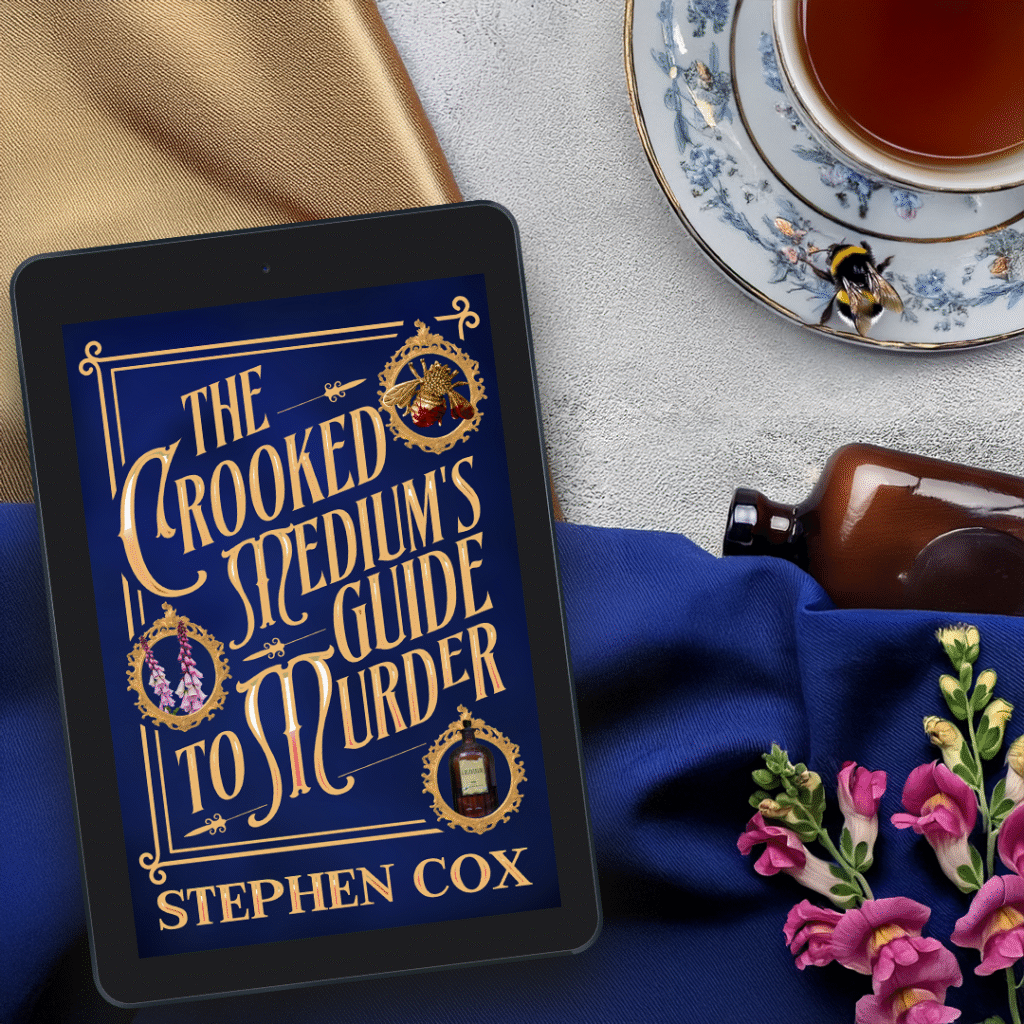


Stephen Cox is a writer living in London. He’d read every Holmes, Christie, and Sayers before he was 21 and did Holmes fanfic in school. He has also read the Moonstone six times. With a science degree he has always been a fan of history and the imagination.
The Crooked Medium’s Guide to Murder contains the strong characterisation, women protagonists, authentic period setting, and wide roaming imagination of his other works.
He says ‘It’s a rip-roaring twisty story, with relationships under stress and surprising readers at every turn.”
His first two novels, Our Child of the Stars and Our Child of Two Worlds were called “heartfelt, imaginative and gripping”, with wide praise in the national press.
Stephen says ‘I wanted female rogues as my leads – people who lead a crooked life, who need to keep secrets, yet can be kind and generous too. This is a rigorous detective story with a client in trouble and old crimes to be solved. It has everything – a brutal man, a Lady in danger, and the past and present feeding the action. Can these outsiders possibly win? Queer women certainly existed and made lives together in Victorian England, as those with eyes to see can see,’
Website * Facebook * X * Instagram * Bluesky * Amazon * Goodreads

The fantasy detective story exists, Joyce.
By Stephen Cox
The novelist Joyce Carol Oates said a couple of years ago that the detective story and fantasy were completely incompatible. The argument was that the detective story is about logic and order and fantasy is just ridiculous because anything can happen. According to her, The Crooked Medium’s Guide to Murder doesn’t exist.
I think this shows a poor understanding of fantasy and in particular, dismisses the intelligence of most of those who write and read it. (I use fantasy to include everything from dragons to spookiness.)
The Crooked Medium’s Guide to Murder is a detective story. It opens with two women asked to investigate the untoward death of a Lady Violet’s mother. The young Lady finds it suspicious but the authorities don’t. Mrs Ashton and her female companion Braddie are already sleuths – their spiritualist scam relies on research and deductions about their clients, since Mrs Ashton cannot in fact speak to the dead. What she can do is sometimes ‘open’ their minds, that is read their thoughts. Soon it is clear that other deaths are also mysterious and linked to Lady Violet’s husband.
Surely that makes solving a case easy? Assemble that the suspects for a crime in one location. Just read their minds!
Of course, it would be tricky to write a series of novels if her power was unlimited. It needs close proximity, ideally touching bare flesh; it involves great mental exertion so it tires her; and it doesn’t always work. We know she’s fallible – Mrs Ashton’s late husband the Major ran off with her money, and she suspected nothing. And she has to judge when to deploy it. Use it too much in the morning and she’ll be lying down on the chaise longue by lunchtime, unable to use her gift.
British detective writers began to talk about the rules of a good story in the 1920s. And various of ‘fair-play’ arose. Not everyone is committed to ‘fair-play’ – famously, the solution of the Murder of Roger Ackroyd by Agatha Christie, pulls a clever trick which breaks it.
I think writers can pull any trick they can get away with, but I follow the core principle of fair-play.
The reader knows what the detective knows. In fact, sometimes the reader may know more.
When Mrs Ashton spots a clue, or reads a stray thought, or has a suspicion, or recalls something from her research, the reader always knows it too.
Therefore, her reading minds is no more problematic than the CSI laboratory. A tool which may add greatly to her knowledge. And something which gives her an edge over Scotland Yard.
I should also say, her power often gets her into trouble, as happens in the book.

Follow the tour HERE for special content and a $10 giveaway!
Sep 9
Kickoff at Silver Dagger Book Tours
Book Bites….with a side of coffee
Sep 10
Lisa Book Krewe – GUEST POST
IS HISTORY THE AGREED UPON LIE? Historical Fact & Historical Fiction.
Sep 11
FUONLYKNEW – GUEST POST
The Dungeon Crawlers – GUEST POST
☼ A Place In The Spotlight ☼ with M.C.V. EGAN
Sep 12
Books+Coffee=Happiness – GUEST POST
Word Processor, Romance, Cats, Kids and Creed
Stormy Nights Reviewing & Bloggin’
Sep 13
Books all things paranormal and romance
Sep 14
Nina Soden #TheRedheadedAuthor – GUEST POST
Sep 15
Sandra’s Book Club – REVIEW
Sep 16
Inside the Insanity – GUEST POST


Sounds like a really good read. Thanks for sharing.
Sounds like a good book. Love the cover.
thanks this sounds really interesting
This sounds like an amazing book.
I love a good mystery.